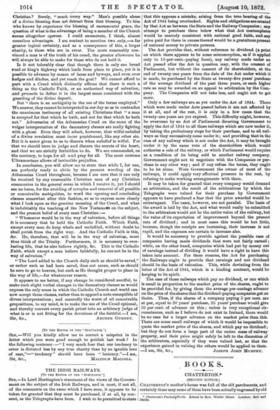THE IRISH RAILWAYS.
[TO THE EDITOR OF THE "SPECTATOR"]
Sra,—In Lord Hartington'e statement of the views of the Govern- ment on the subject of the Irish Railways, and in most, if not all, of the comments on the same which I have seen, it appears to be *taken for granted that they must be purchased, if at all, by con- sent, as the Telegraphs have been. I wish to be permitted to state that this appears a mistake, arising from the true bearing of the Act of 1844 being overlooked. Rights and obligations are created by that Act as between the State and the Railway Companies ; any attempt to purchase them below what that Act contemplates would be scarcely consistent with national good faith, and any price paid for them in excess thereof would be a gratuitous present of national money to private persons.
The Act provides that, without reference to dividend (a point on which there appears to be some misconception, as if it applied only to 10-per-cent.-paying lines), any railway made under an Act passed after the Act in question may, with the consent of Parliament, but without the consent of its shareholders, at the end of twenty-one years from the date of the Act under which it is made, be purchased by the State at twenty-five years' purchase of the average dividend of the past three years, or such higher rate as may be awarded on an appeal to arbitration by the Com- pany. The Companies will not take less, and ought not to get more.
Only a few railways are as yet under the Act of 1844. Those which were made under Acts passed before it are not affected by it at all, and of the rest, it is only in a few cases that the twenty.one years are yet expired. This difficulty might, however, be overcome by an Act of Parliament directing Government to apply the Act of 1844 to all those railways which are now ander it, by taking the preliminary steps for their purchase, and to all rail- ways as they successively come under it ; and providing that in the case of any railway which is not under the Act, it may be brought under it by the same vote of the shareholders which would authorise a sale of the railway, or which Parliament would require as a condition of its being sold to another railway company. Government ought not to negotiate with the Companies or pur- chase in any other way ; and if any refuse the terms, they ought to be let alone. Were Government the owner of most of the railways, it could apply very effectual pressure to the rest, by refusing to make working arrangements with them.
It may be taken for granted that every company would demand an arbitration, and the result of the arbitrations by which the Telegraphs were valued for their purchase by Government appears to have produced a fear that the price awarded would be extravagant. The cases, however, are not parallel. The basis of the award is laid by the Act, and what would really be submitted to the arbitrators would not be the entire value of the railway, but the value of its expectation of improvement beyond the present rate of dividend ; and in most cases this would be but little, because, though the receipts are increasing, their increase is not rapid, and the expenses are certain to increase also.
It would be necessary to provide against the possible case of companies having made dividends that were not fairly earned ; while, on the other hand, companies which had put by money out of earnings instead of dividing it would have a right to have this taken into account. For these reasons, the Act for purchasing the Railways ought to provide that earnings and not dividend should be the basis of valuation. This, while deviating from the letter of the Act of 1844, which is a binding contract, would be keeping to its spirit.
The case of those railways which pay no dividend, or one which is small in proportion to the market price of the shares, ought to be provided for, by giving them the average per-tentage advance on the price of the shares that the dividend-paying companies get on theirs. Thus, if the shares of a company paying 5 per cent. are at par, equal to 20 years' purchase, 25 years' purchase would give 25 per cent. of advance on this ; unless in very exceptional cir- cumstances, such as I believe do not exist in Ireland, there would be no case for a larger advance on the market price than this.
There are some small railways of which it would be impossible to quote the market price of the shares, and which pay no dividend; but they do not form a large part of the entire mass of railway property, and their price might safely be left to the discretion of the arbitrators, especially if they were valued last, so that the experience gained in valuing the others would be applied to them.
































 Previous page
Previous page